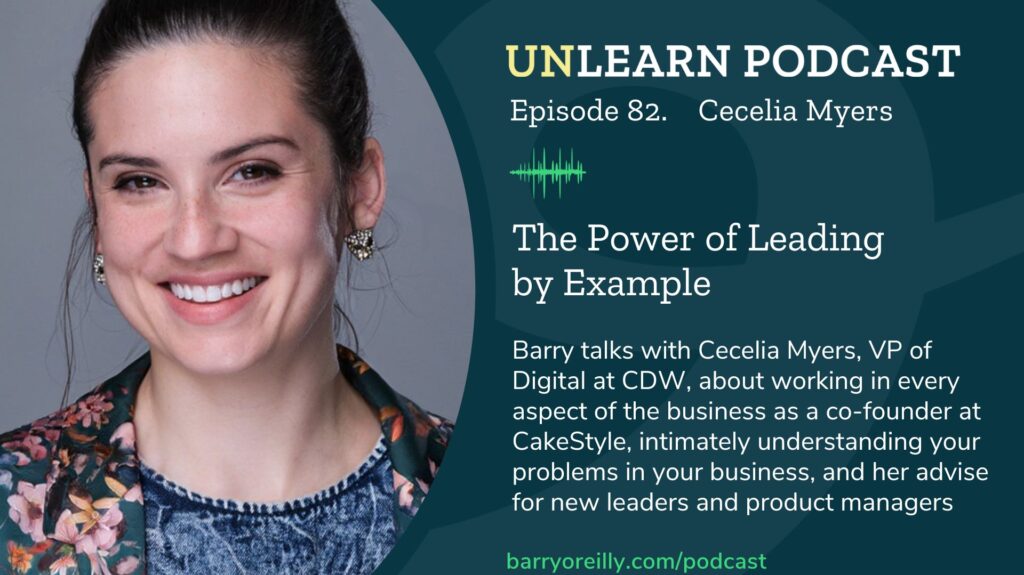Cecelia Myers is the VP of Digital at CDW, where she leads their product management, design, demand generation, customer integration, and merchandising teams. She has a deep breadth of experience from a variety of high-profile startups and tech companies and uses that to create a culture of empowerment and openness at CDW. She is a builder of new experiences and business models from co-founding a startup to the Fortune 500, a design thinker, a survivor of lymphoma, and a voracious reader. She joins Barry O’Reilly today, to talk about how leading by example can help you create the kind of culture you want to build.
Following Interests and Opportunities where they Lead
Cecelia left university with one of those “never land a job” majors – but she didn’t have that problem, becoming a personal archivist at a startup that managed documents for high net-worth people. This company didn’t survive the 2008 crash, but Cecelia was invited by the VC foundry that had funded the company to join them. There, she co-founded CakeStyle, leading and working in every aspect of the business. Barry points out that many product managers don’t get the kind of hands-on experiences that give Product Managers insight into the customer experience. [Listen from 01:55]

Intimate Understanding of the Problem
Do you understand the problem you’re trying to solve? People often think they know, Cecelia notes, but unless you’re digging deep into the heart of things, it’s a hard thing to understand. Intimate knowledge of what is really happening at a company is hard to replace with any kind of experience or education. There’s something energizing about connecting at a visceral level to what you’re doing – it can be really fun! Barry shares how they take senior executives out of their companies at ExecCamp, and make them act as operators in their businesses. This provides unmatched insight to what it’s like being a customer in the business. [Listen from 7:00]
Unlearning Old Skills
Moving into a company like Groupon, which was so new and so technology-driven was a culture shock. Politics, senior leadership, red tape – it meant having to convince finance departments and leadership that ideas were worth trying. For someone used to having control of the vision, having to work with so many other heavily involved people was a challenge, but ultimately a chance to exercise that skill of digging in deep to the business and influencing others. It was a whole new scope of managing people and leading teams. Cecelia reflects at how her new skills and knowledge might have impacted her work at CakeStyle. Barry adds that there are some lessons you can only learn by doing, and that can be really difficult. [Listen from 10:50]
(Listen to “Unlearn Season Three Finale“)
You’re not Scaling Yourself
Cecelia would advise new leaders and product managers to focus on empowering teams to do the work. Leaders need to hire the right people, give them the vision, and support them in accomplishing it. They should ONLY be focusing on that, not scaling or promoting themselves. Barry agrees and adds how fascinating it is that so much of our competency as we start our careers is about executing on things. But that isn’t the type of skill that helps you manage and lead teams – a different set of abilities is required to create an environment where other people can execute. Cecelia notes that her education and passion for reading has been extremely valuable in learning to create those kinds of environments. Reading shows you a lot of different ways of communicating. Her most important tip? Start with the end and make the most important point at the beginning. [Listen from 17:00]
Leaders need to hire the right people, give them the vision, and support them in accomplishing it. They should ONLY be focusing on that, not scaling or promoting themselves. —Tweet This
Do the Thinking up Front
If you want to communicate well, you have to do your thinking in advance, and edit your ideas, so they come across clearly and correctly. “Everyone needs a second set of eyes,” Cecelia says, and having an editor who can help you make things shorter, more concise and more effective helps you communicate with your team and your board. This is a lot of what her job is now – making sure that different managers and team members know what they’re supposed to be working on and why. Barry calls out the idea that not everyone is going to read the whole email or memo, and you need to compensate for that in your communications [Listen from 22:30]
“Everyone needs a second set of eyes,” —Tweet This
Leading by Example
Barry asks Cecelia what skills she has had to develop, working for a huge organization like CDW. When you don’t know everyone that you’re working with and responsible for, you have to find new ways to communicate with them. She emphasizes the importance of sharing yourself and being yourself to be more available and approachable when people need you. The key message to communicate is that we’re not really different people – we just have different roles in the business. You need to convey that it’s okay to bring yourself to work. Life happens, and it’s easier for leaders to do it, and create the culture where life happens to everyone. Barry shares an insight he had that the best person to be was himself. It’s harder than you might expect! [Listen from 24:45]
Looking forward
Cecelia is looking forward to watching CDW evolve and go to market as a technology first, and how cool it would be to see a commercial featuring the products they are building. Seeing a company grow into being a market leader, and a place that attracts talent is inspiring. “It’s one of those gems that people don’t really know about.” [Listen from 31:30]















